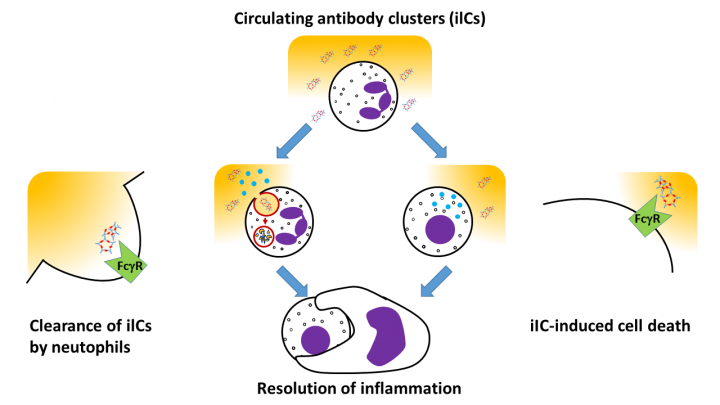New cell behaviour discovered in the immune system which affects autoimmune diseases including rheumatoid arthritis
March 2021: Dr Utsa Karmakar and colleagues from the Centre have discovered a new behaviour of immune cells, called neutrophils, that is important in auto-immune conditions including rheumatoid arthritis.
Inflammation is part of the immune response against infections and helps kill germs that cause disease. Inflammation also attacks the body’s own tissues, so it is important that inflammation is resolved once the threat has been removed.
In some situations, this resolution is not efficient. Some cells that are ‘pro-inflammatory’ continue to make signals that encourage inflammation. This is the case in autoimmune diseases such as rheumatoid arthritis (RA), where long-term inflammation can cause a lot of damage to the joints. Other cells make antibodies, tags that stick to invasive objects like germs. In RA and other autoimmune diseases, antibodies form clusters or ‘aggregates’ which circulate in the blood.
In RA, these antibody clusters are found in large numbers in fluid around the joints. They stick to the surface of the joints, triggering localised inflammation. A type of immune cell called neutrophils are particularly important in the immune system’s response to antibody aggregates.
Antibody aggregates cause neutrophils to generate a lot of inflammation, and also to recruit more neutrophils – this can create a runaway effect that results in chronic disease like arthritis. Neutrophils have long been seen as major pro-inflammatory cells. For inflammation to resolve, neutrophils have to be cleared away by anti-inflammatory immune cells.

Our work has identified that neutrophils have a pro-resolution function as well as the expected pro-inflammatory response. We show that in addition to activating the neutrophils, the antibody aggregates trigger their own uptake by the neutrophils, and cause the neutrophils to commit cell suicide. In this way, antibody aggregates are not only cleared from bodily fluids instead of causing inflammation, but suicidal neutrophils generate ‘find me’ and ‘eat me’ signals.
Neutrophils promote their own clearance by pro-resolution immune cells, rather than recruiting additional neutrophils. Our work suggests an important and previously not appreciated anti-inflammatory function of pro-inflammatory neutrophils in autoimmune diseases such as RA that are characterised by large numbers of circulating antibody aggregates.
Written by Utsa Karmakar, Sonja Vermeren and Lana Woolford

